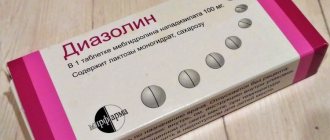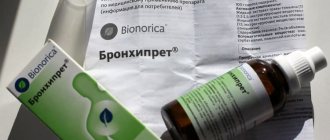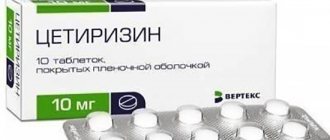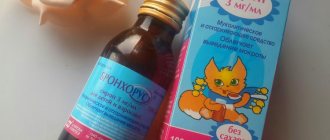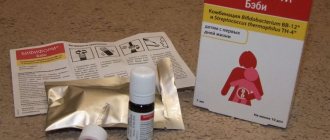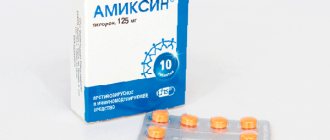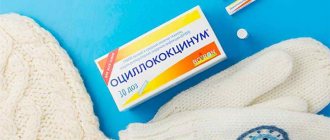Various pathological processes in the upper respiratory tract occur in children all the time, especially in the autumn-winter period. Pectusin is just that herbal preparation of combined action that is widely used for complex therapy for inflammatory diseases of this type.
What are Pectusin tablets, can they be used to treat children, what is stated in their instructions for use, and whether this drug exists in syrup form - read on.
Compound
One tablet of the drug contains: racementol - 4 mg, eucalyptus - 500 mcg.
Excipients in the tablet: powdered sugar - 0.75 g; carboxymethylcellulose sodium salt - 0.012 g; calcium stearate - 0.0035 g.
Patients often ask for Pectusin syrup at the pharmacy, confusing it with Pertussin , but this form of release does not exist for the first drug.
Side effects
Any medicine has a number of side effects, but herbal preparations do not have many of them. Negative reactions to Pectusin are very rare. The herbal medicine causes allergies only in persons with individual intolerance to the components of the drug - menthol and eucalyptus. It manifests itself as redness and rashes on the skin, similar to hives. Some patients, in addition to an allergic reaction, may complain of itching all over the face. If such a reaction to the drug occurs, then you should stop taking it and consult a doctor.
- Fish and potatoes in the oven: recipes with photos
- Cough in people with heart failure
- Isofra - instructions for use for children and adults
Pharmacodynamics and pharmacokinetics
Pectusin is a combined drug with a local irritant effect containing menthol . The effect of menthol is due to reflex processes of irritation of sensitive receptors of the mucous membranes. It has a mild local anesthetic effect and minor antiseptic properties.
Eucalyptus oil stimulates mucosal receptors and has an antiseptic and anti-inflammatory effect .
Mechanism of action
In general, the drug has an antitussive effect. Once in the oral cavity, the active components of Pectusin irritate peripheral nerve endings. This helps reduce inflammation of the upper respiratory tract, which makes coughing easier. This principle of Pectusin’s effect on the nasopharynx area is explained by the properties of the substances included in the drug:
- Menthol. It is characterized by an antiseptic, cooling, anesthetic and local irritating effect. It is a catalyst for local reflex reactions that cause the activity of mucous membrane receptors.
- Eucalyptus oil. Thanks to its antimicrobial effect, it destroys pathogenic organisms and completely stops the inflammatory process.
Analogs
Matches by level 4 ATC code: Broncho-munal
IRS 19
There are many analogues of Pectusin with a similar effect: Ascoril Expectorant (syrup), Broncho Theiss (drops), Bronchostop (drops), Pertussin (syrup), Tusavit (syrup), Eucabal (syrup).
Contraindications
Instructions for use of Pectusin include information about contraindications to the use of the drug. The composition of the drug includes sucrose, which helps increase blood sugar levels. For this reason, the medicine is contraindicated in diabetes mellitus. It should not be taken if you have bronchial asthma. The irritating effect of the tablets will not alleviate the condition, but will provoke a severe cough, which will lead to another attack. Instructions for use of Pectusin contain other contraindications:
- spasmophilia;
- stenosing laryngitis;
- individual intolerance to the components of the drug;
- glucose-galactose malabsorption;
- deficiency of isomaltose and sucrase.
Pectusin is not prescribed to children if their age is less than 7 years, or is prescribed with caution. The fact is that it is difficult for children to keep the tablets in their mouths until they are completely absorbed. There is a risk that it will get into the child’s windpipe or he will simply choke. To treat a throat in children, it is better to use medicine in syrup form. Otherwise, Pectusin has no contraindications and is an excellent expectorant.
Pectusin price
The price of tablets (10 pieces) in Russia will be 25-40 rubles. In Ukraine, the price of Pectusin of the same dosage is on average 22 hryvnia.
- Online pharmacies in RussiaRussia
- Online pharmacies in UkraineUkraine
ZdravCity
- Vialine pectusin oral spray 45mlEsko-pharm LLC
125 RUR order
Pharmacy Dialogue
- Pectusin (tab. No. 10) Vifitech CJSC
26 RUR order
- Pectusin (tab. No. 10) FS.-Leksredstva
28 RUR order
- Pectusin (tab. No. 10) TCPP
38 rub. order
show more
Pharmacy24
- Pectusin DD 0.7 g N20 tablets lemon TOV NVP Biostimulator, Ukraine
27 UAH.order - Pectusin DD 0.7 g N20 tablets TOV FK Biostimulator, Ukraine/TOV NVP Biostimulator, Ukraine
27 UAH order
Release form
This medicine has only one form of release - tablets. There is no such drug as Pectusin cough syrup. The tablets are white in color and have a pleasant refreshing sweetish-mint taste. They are produced in blister packs of 10 pieces. A cardboard pack of such plates may contain 2, 3 or 5. The peculiarity of the tablets is that they do not need to be swallowed, but dissolved. There are several more distinctive characteristics of the drug:
- The composition of the tablets includes about 750 mg of simple carbohydrates, equal to 0.05 bread units. This information is especially necessary for diabetics.
- The medicine is stored for up to 3 years in a place protected from sunlight and at room temperature. If these conditions are not met, the physicochemical properties of the drug may change. This is manifested by color changes. If stored in a humid environment, tablets may become loose or begin to crumble. It is already prohibited to take Pectusin in this form.
- The composition of the drug does not in any way affect the speed of reactions, the ability to drive a car or concentration. For this reason, the medicine is approved for use in people with any professional activity.
Indications for use
Cough tablets, as a rule, are not used as monotherapy in the treatment of respiratory diseases. It is more correct to use pectusin in combination with antiviral, antibacterial agents or other antiseptics for nasopharyngeal diseases.
Lozenges are prescribed to patients with a dry cough and sore throat due to infectious-inflammatory and cold-related respiratory diseases:
- laryngitis;
- bacterial and viral sore throat;
- pharyngitis;
- tracheitis;
- mild bronchitis;
- chronic or acute rhinitis, causing cough;
- tonsillitis.
Pectusin can be used regardless of the severity of the disease. However, for infectious pathologies that are accompanied by high body temperature, the effectiveness of the drug is minimal.
The instructions for use of these lozenges do not indicate the possibility of their use for prophylactic purposes. However, in practice, doctors recommend taking Pectusin to people who, due to their professional activities, have to deal with intense stress on the vocal cords (teachers, singers, announcers).
The tablets help eliminate swelling of the larynx and significantly reduce the risk of developing reactive laryngitis.
Reviews
Lisa: “The drug of my childhood: cheap and reliable. My mother constantly treated me with it, and it always worked flawlessly. My son is still too small to give him Pectusin, but I will certainly do this when he grows up.”
Valeria: “Problems with my throat have haunted me since childhood. All I have to do is drink something from the refrigerator and I already feel the familiar tingle. I have had only one treatment regimen for many years: Pectusin and soda-salt rinse, and it has never let me down! I simply admire the drug Pectusin, because it is affordable and very effective.”
Antonina: “Pectusin is an analogue of the imported and expensive Gedelix. It costs several times less, but helps with a sore throat very well. Of course, it will not eliminate the cough on its own; here it must be used in combination. But it helps 100% with a sore throat! There was only one case when for some reason he did not help either me or my husband. However, most likely, then we ran into a fake. It happens! Beware."
Oksana: “As for me, Pectusin is a very, very weak medicine. Hence the price is appropriate. It may eliminate a slight sore throat due to the anesthetic effect of menthol, but it will not cope with a more serious problem. I had pharyngitis, which was subsequently supplemented by a slight cough. So, I took about 50 of these tablets in total, but there was “0” benefit. Don’t count on the miraculous effect of this cheap remedy.”
Larisa: “This is a very worthy drug for little money. Of course, it will not cure pneumonia and flu, but if you just have a sore throat and a stuffy nose, then it will help without fail. Well, it works no worse than its expensive and imported analogues - tested from personal experience.”
Drug interactions
The official instructions from the manufacturer of Pectusin do not contain information about the interaction of active substances with components of medications used in parallel during the treatment of cough. The safe combination with other drugs is also evidenced by patient reviews.
When Pectusin is used together with mucolytics and expectorants, the liquefaction and removal of sputum occurs faster, and a sore throat disappears due to the elimination of inflammation of the mucous membrane.
Pectusin
Cough tablets based on eucalyptus oil and menthol partially inhibit the activity of pathogenic bacteria, but do not interact with antibiotics and do not help with pneumonia, bronchitis, tracheitis.
The drug Pectusin is not prohibited from being used with alcohol, however, the effectiveness of the tablets when combined with ethanol may decrease. If it is necessary to use other antitussives in parallel, you must carefully study the instructions or consult a doctor to prevent side effects and overdose.
Instructions for use, dosage
Pectusin must be used sublingually. The drug is placed under the tongue and held until the tablet softens and dissolves. Using the medicine in this way allows you to achieve the expected result due to prolonged and systematic reflex irritation of the nerve endings of the throat.
According to the annotation:
- the optimal daily dose is 3-4 tablets;
- The drug must be taken at least 1 hour before meals;
- After using Pectusin, it is advisable not to eat anything for the next 1.5-2 hours.
These recommendations for dosing of the drug are indicative. The duration of the course of therapy and the daily dosage of the drug are established by the attending physician on an individual basis, based on the clinical picture of the patient, his age, additional diseases in the anamnesis and other conditions.
When side effects occur, specialists do not always decide to cancel treatment with Pectusin. If the symptoms are mild and do not cause severe discomfort to the patient, the recommended dosages are first reviewed. If dose adjustment does not lead to positive changes, stop taking the tablets and replace Pectusin with a suitable analogue.
In the reviews of some patients, there are doubts about whether this drug can be used for wet cough. Pectusin is effective both in the absence and presence of expectorated secretions. In this case, the use of tablets for copious sputum production should be combined with the intake of additional drugs from the group of expectorants and mucolytic medications.
Pectusin is most often prescribed to relieve a cold cough, accompanied by soreness in the upper respiratory tract. Lozenges do not help liquefy mucus, however, according to doctors, they block the development of the inflammatory process and help to establish normal functioning of the bronchi.
For children
Pectusin can be given to children over 7 years of age for coughs. For a school-age child, 1 tablet 1-2 times a day for a week is enough. The duration of therapy can be increased by the doctor upward (up to 10-14 days) if the patient shows positive dynamics, but to consolidate the therapeutic effect, an extension of the course is required.
Adolescents over 12 years of age are allowed to give the drug 3 times a day. Children, as well as adult patients, should not take lozenges simultaneously with food or drink.
For adults
Adult patients can take Pectusin 4 times a day, 1 tablet. This dosage is considered the most appropriate in most cases.
In addition, you cannot take more than 4 tablets during the day - this is the maximum daily amount.
Overdose
If you take the pills without neglecting the recommendations of doctors, the likelihood of any harmful or dangerous consequences is minimal. Pectusin has a sweetish, pleasant taste, so hypothetically the medicine could attract the attention of a preschool child. This must not be allowed!
When poisoned with this medication, patients experience the following symptoms:
- dyspeptic disorders;
- headache;
- hyperexcitability, quickly and unreasonably replaced by increased drowsiness.
There is no specific antidote for an overdose of Pectusin, and therefore, you should follow the standard scheme used for food and drug poisoning of varying degrees of severity:
- Rinse the stomach by drinking 1.5-2 liters of water. In the absence of vomiting, rinsing is carried out using a probe.
- Give the patient adsorbents (the simplest is activated carbon).
- Provide the patient with a comfortable body position, measure body temperature, pulse rate, and blood pressure.
There is no confirmed information about severe cases of overdose with Pectusin.
At what age can the drug be used?
Pectusin is a lozenge that is not suitable for patients of all age groups. For example, doctors prescribe this drug to children only after reaching 7 years of age. The ban on treating cough with Pectusin in children is justified by the need to use the drug sublingually, which cannot be explained to a small child.
The tablet must be held under the tongue until it is completely dissolved, and in most cases, children simply bite into pieces or swallow the drug entirely, and therefore the proper therapeutic effect does not occur.
general characteristics
Pectusin is the simplest medicine.
It is used as part of a complex of therapeutic procedures in the treatment of mild forms of pathologies.
It belongs to the category of pharmacological cough medicines, which are made on the basis of natural remedies. The composition includes two herbal and one auxiliary substances. Active components of the drug:
- Levomenthol
(L-menthol). A natural component, it is one of the isomers isolated from mint essential oil. It has an irritating, vasodilating and antiseptic effect on local receptors located on the mucous membrane that covers the respiratory tract. - Eucalyptus oil
. Obtained from an extract of the plant of the same name. The oil has bactericidal properties and is effective against protozoan and fungal protozoa. Has mucolytic and expectorant effects.
Sucrose is the crystalline binding component. Accelerated dissolution and high absorption of crystals allows you to quickly deliver active substances to the site of inflammation. A number of manufacturers include peppermint oil in the composition of the drug. This substance relieves pain, relaxes smooth muscles and helps clear the airways.
Release form and analogues
There is only one pharmaceutical form in which Pectusin is produced. It is produced in the form of tablets intended for resorption. They are packaged in paper packaging or a foil blister.
The tablets are white, flat-cylindrical, with a distinct odor of menthol and eucalyptus. Each tablet may contain from 2 to 4 mg of levomenthol
, 0.5 mg
eucalyptus
and 2 mg peppermint oil.
Pharmacies sell Pertussin syrup, which is confused with Pectusin; it is also a drug for treating coughs, but consists of other active ingredients.
There is a common misconception about the presence of Pectusin in liquid form. This medicine is not produced in syrup form; there are only analogue drugs with a partially similar composition and similar pharmacological action (Pertussin, Gerbion, Travisil syrups, Sinekod medicine). Among tablet analogues that have a similar effect, there are the following well-known drugs:
- Mint tablets;
- Bromhexine;
- Mukaltin.
The identical composition of components is present only in Evamenol nasal ointment. It is recommended for use in patients who have diabetes. The ointment has the same effect as tableted Pectusin, as it is its variety. It has an additional therapeutic effect for diseases of the nasopharynx, since it is administered through the nasal passages.


